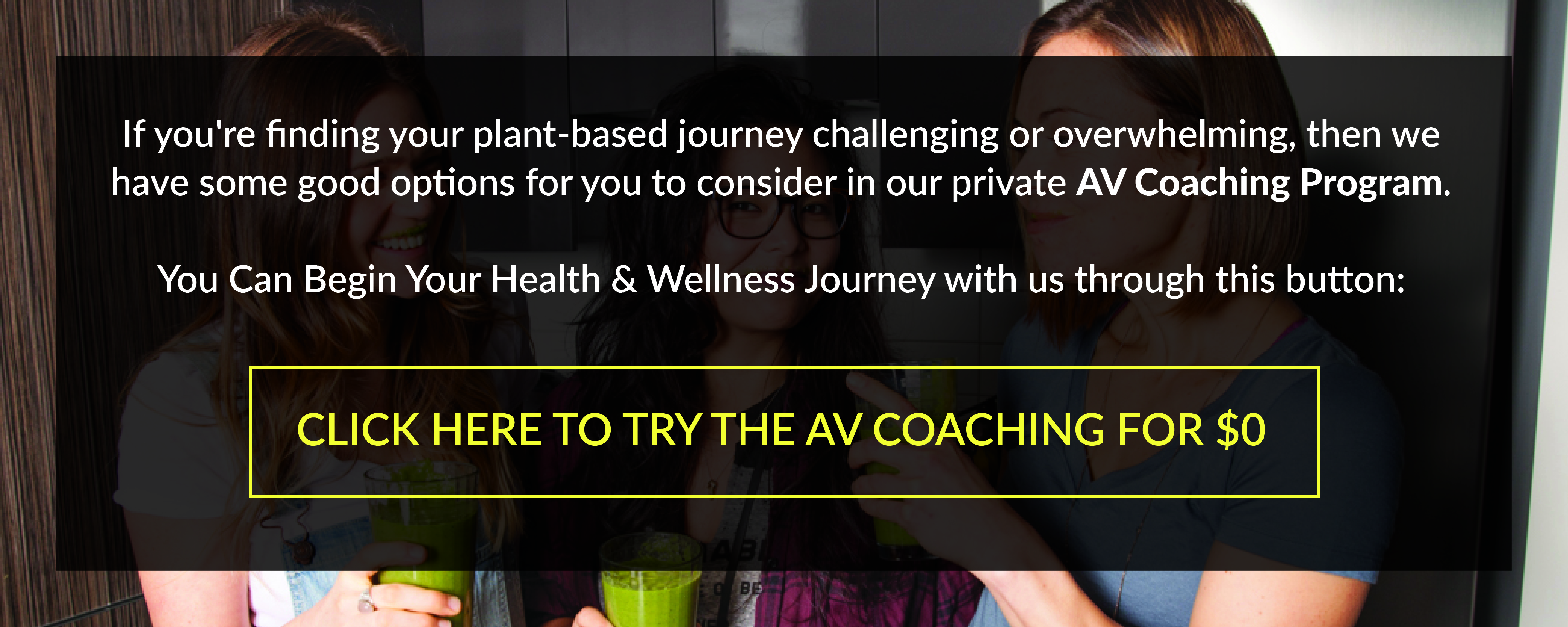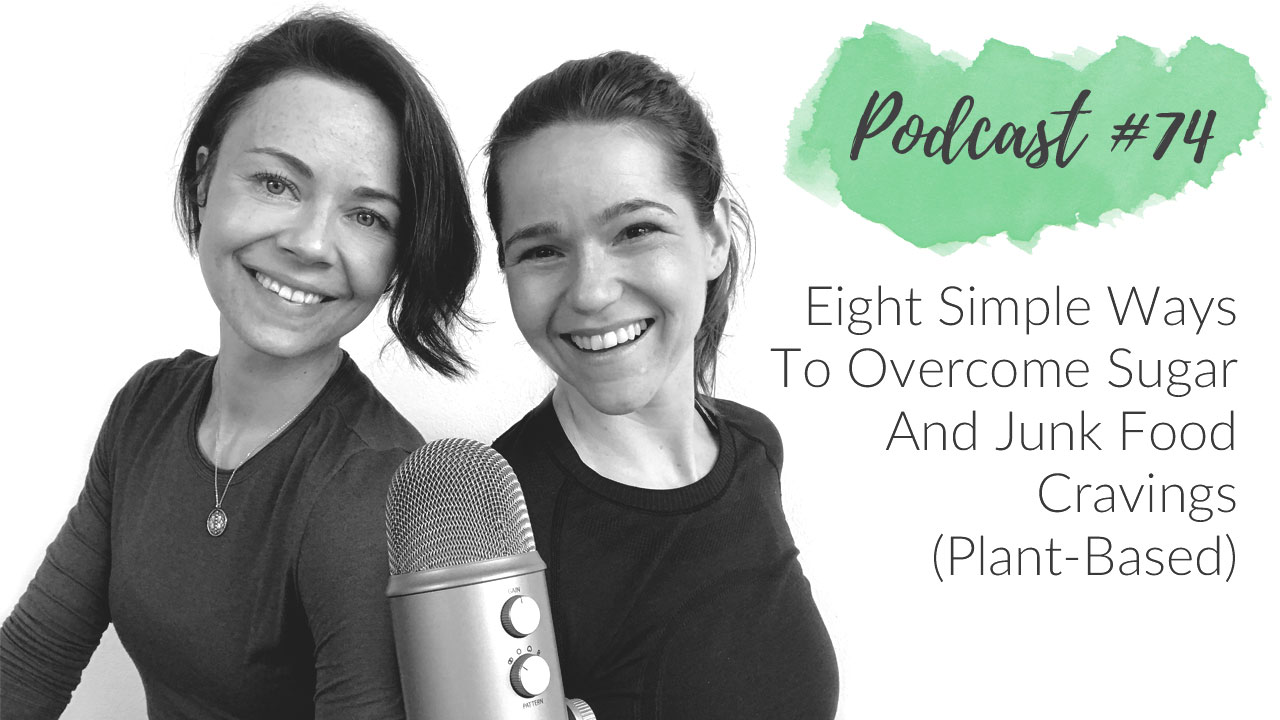
LISTEN NOW or WATCH HERE
Q: I am completely addicted to sugar and carbs, and being vegan has sort of given me an excuse to indulge in these even more. What can help me stop eating so many carbs?
This is a common struggle and in fact, most vegans, as well as vegetarians, are actually more “pastatarians” or “carbotarians.” They replace meat, seafood, and dairy products with bread, starches, processed carbohydrates and meat-substitutes, all of which are high in sugar and very acidic.
We promise to give you practical advice on how to break free from processed junk food and sugar addiction but first, let’s explore a few key pieces of information that will help all of us understand this whole obsession with carbs and cravings.
SUGAR, SUGAR, EVERYWHERE
This sugar/carb dilemma is not only a challenge for those who chose to avoid eating meat and animal products. Our society, in general, has become addicted to sugar. And even though most of us know quite well that eating processed carbs and sugary foods are unhealthy, many people find it very difficult to resist those intense cravings for something sweet.
Soft drinks, cookies, doughnuts, cakes, ice cream, candy bars and cereals are the apparent foods with high sugar content. However, there are those sneaky sugars that show up in foods like bread, ketchup, spaghetti sauce, salad dressings. Even some so-called “healthy” foods like granola bars, low-fat yogurt and protein powders have an insane amount of sugar. Sugar is so popular it goes by about 65 different names!
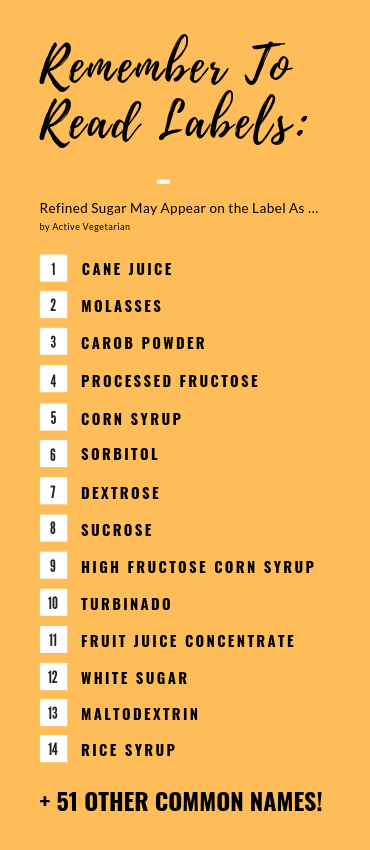
*Image links to 51 other common names.
SUGAR ADDICTION: THE WHITE POISON
Sugar is often accurately called a drug, and in reality, it is a human-made chemical. Those who use much of it (in any form) sooner or later will experience the same degeneration that a drug addict goes through. Yes, this might sound a little extreme, but the point we are trying to bring across here is that like many types of addictions, sugar addiction can be deadly.
I vividly recall a childhood memory when my father would jokingly comment “Sugar is white poison” as he was adding a couple of spoonfuls of the “venom” into his afternoon coffee. Poison is right! Today we are being presented with supporting evidence proving to us that sugar is a primary contributing factor causing not only obesity and diabetes but other chronic and fatal diseases.
SUGAR WILL CORRUPT YOUR ENTIRE BODY
Eating sugar is like opening Pandora’s box. Many of us learned in early childhood that eating processed sugar such as candy has a damaging effect on the teeth, but that’s not the end of the story. It also causes intestinal disorders and diabetes. White sugar has a very negative impact on women, increasing pain during menstruation, causing mood swings and overall weakness and fatigue. Most of us woman learned to accept it and consider it “natural,” but it is, in fact, utterly unnatural and unnecessary to go through these symptoms and discomfort. Avoiding processed sugar is a great start! Not only for women, but sugar is also indeed toxic to anybody, and it’s just a matter of time before we will commonly accept it as a causative factor in most cancer. In the same way, that now we accept without question that smoking and alcohol abuse are direct causes of lung cancer and cirrhosis of the liver. So if you believe that you or someone you know is addicted to sugar, it is time to look at this site and get them help.
CARBOHYDRATES AND SUGAR, KNOW THE DIFFERENCE
Carbohydrates are your body’s primary source of energy; for instance, your brain can only use carbohydrates for energy. Carbs are also essential in the function of your metabolism. Your body breaks down these carbohydrates into glucose (simple sugar), which supplies energy. There is always sugar present in your bloodstream, which is known as blood sugar. And this blood sugar, or blood glucose, is sugar that the bloodstream carries to all the cells in the body to supply energy as mentioned earlier. However, not all carbohydrates are created equal and eating the right carbs, is what is essential to your body’s well being.
GOOD CARBS VS BAD CARBS
The two main forms of carbs are:
- SIMPLE carbohydrates (or simple sugars): including fructose, glucose, and lactose, which also are found in nutritious whole fruits.
- COMPLEX carbohydrates (or starches): found in foods such as starchy vegetables, whole grains, rice, bread and cereals.
SIMPLE CARBOHYDRATES – REFINED
Refined simple carbohydrates are when natural ingredients, such as sugar cane, are processed or refined into a product such as table sugar. Refined carbohydrates are added to foods as sweeteners, and include corn syrup, brown sugar and high-fructose corn syrup. Refined carbohydrates provide high-calorie counts but have little or no nutrient value. In other words, for the number of calories consumed, your body receives little benefit. To manage your weight and maximize your nutrition, limit the amount of refined carbohydrates in your diet.
Examples of Simple Refined Carbohydrates include:
- Regular White Bread
- Croissant
- Bagel
- Pastries
- Candy
- Cake
- Soda
- Chips
- Most Boxed Breakfast Cereal
- Yogurts
- Ice Cream
- Fruit Juice From Concentrate
- Anything that contains high fructose corn syrup, which is one of the worst sugars for our bodies!
SIMPLE CARBOHYDRATES – NATURAL
Simple carbohydrates aren’t necessarily all bad carbs — it depends on the food you are consuming. For instance, fruits and certain vegetables naturally contain simple carbohydrates composed of basic sugars. Natural sources of simple carbohydrates provide quick energy and boost your health by supplying essential vitamins and minerals necessary for good health.
Examples of Natural Simple Carbohydrates include:
All raw fruit, such as
- Bananas
- Mangoes
- Grapes
- Oranges
- Melons
- Pineapple
- Pomegranate
- Raisins
- 100 % cold-pressed fruit juice
- Honey (not vegan)
COMPLEX CARBOHYDRATES
Complex carbohydrates have a sugar structure, called starch, that requires your body to work harder to access it. Meaning that the complex carbohydrates release their energy at a slower rate than simple carbohydrates and will not cause a sharp blood sugar crash. Complex Carbs can be found in high-fibre foods, which improve your digestion and gut health. They help stabilize the blood sugar, keep your energy at an even level, and help you feel satisfied longer after your meal. You will find the best kind of complex carbohydrates in whole plant foods that are high in vitamins and minerals.
Examples of Healthy Complex Carbohydrates include:
- All green vegetables
- Broccoli
- Cauliflower
- Brussel sprouts
- Peppers
- Mushrooms
- Eggplant
- Celery
- Peas
- Plantains
- Squash
- Root Vegetables
- Sweet potatoes
- Quinoa
- Oats
- Buckwheat
- Brown or Wild rice
- Legumes (black beans, chickpeas, lentils, and others)
- Sprouted grain bread
CHOOSING THE RIGHT ONES:
We always encourage to base your diet around whole, unprocessed plant-based foods and avoid as many packaged foods as possible. However if you are buying packaged foods, it’s essential to scan ingredient labels for the word “whole” in front of the word “grain” and make sure that corn syrup, milk, eggs, cheese, sugar (or any sweetener), enriched flours, modified ingredients, or any of the other simple carbohydrate doesn’t appear among the ingredients on the list. When trying to figure out if a source of carbs is good or bad, remember this: The higher in sugar it is, and the lower in fibre, vitamins, and minerals, the worse the food is for you. Aim for ingredient lists with few words, and make sure they are whole, plant-based foods.
Avoid:
Avoid animal foods. Understand that all types of meat, milk, and eggs are essentially devoid of natural fibre rich carbohydrates. Instead, they promote weight gain, bloating, gas, and food toxicity. Most importantly, they are one of the major sources of chronic illnesses.
We realize that, due to its addictive nature, cutting down on sugars, unhealthy carbohydrates and processed vegan foods can be a real challenge for some. Mainly if you are heavily relying on them right now, so how do you break the sugar habit once and for all and banish your cravings for unhealthy foods?
Here are 8 simple ways to overcome sugar cravings and replace unhealthy processed carbs with nourishing plant-based foods:
1. Let Nature Satisfy Your Sweet Tooth
In most cases when we crave sugar our body is actually asking for nutrients. When you rely on foods like pizza, pasta, bread, fast food and other processed nutrient-depleted foods it’s no wonder that you are unable to satisfy those cravings. There is practically zero or very little amount of nutrients in those types of foods. So instead eat more Whole Foods. It’s that simple. By eating more high nutrient-dense foods, your energy will rise, body fat will decrease, mental clarity will be enhanced, and cravings for refined foods and sugar will fade. In our experience working with coaching clients, a surprising amount tells us that soon after adopting a whole food plant-based diet that’s free of processed foods, they quickly start to get a handle on things, and the cravings and overeating naturally stops.
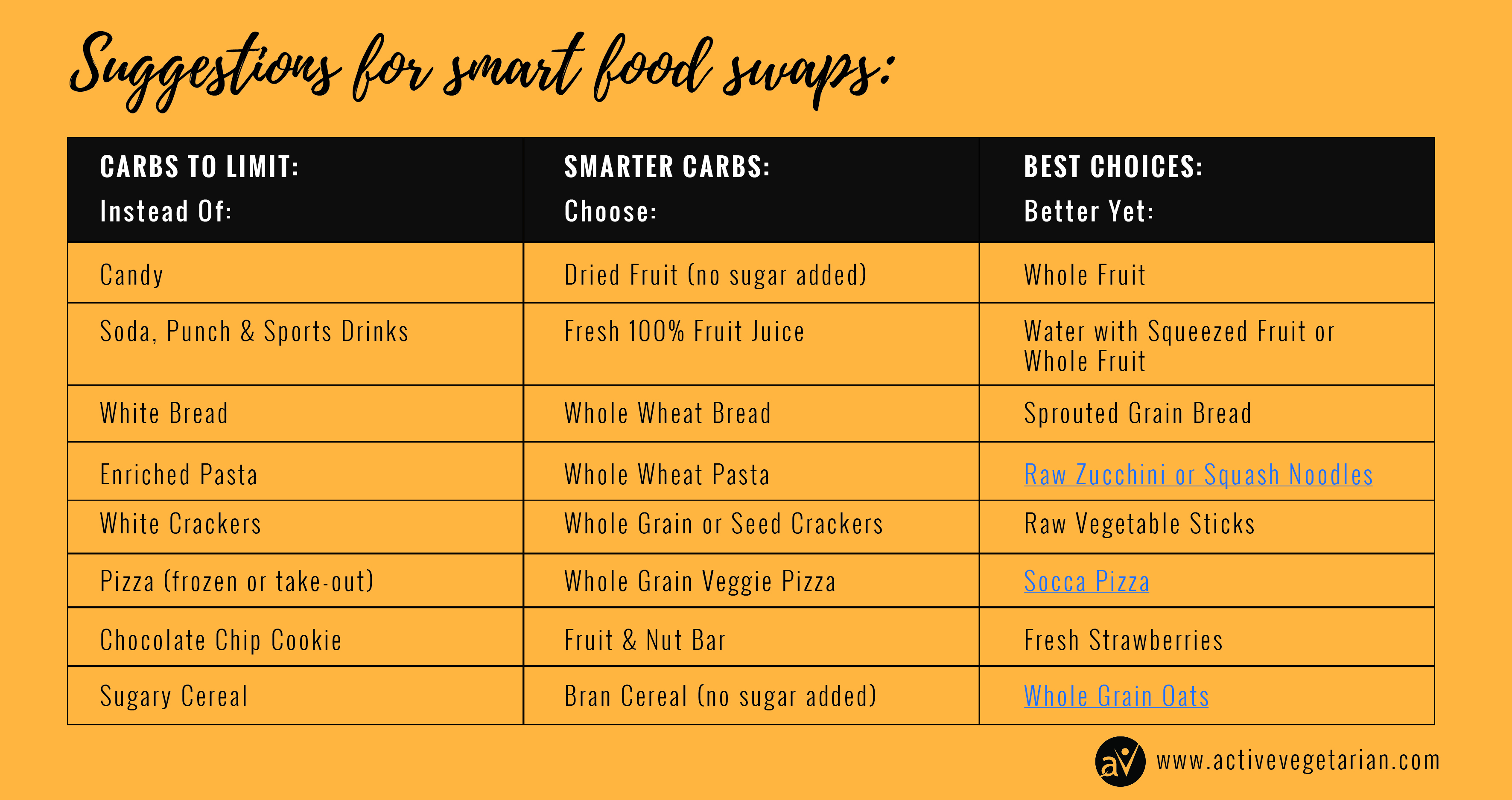 *If you still want to use a sweetener occasionally, the sweet herb stevia makes a good sugar substitute. (Avoid ALL artificial sweeteners, which can damage your health even more quickly than sugar.)
*If you still want to use a sweetener occasionally, the sweet herb stevia makes a good sugar substitute. (Avoid ALL artificial sweeteners, which can damage your health even more quickly than sugar.)
2. Make Sure You Eat Enough
Hunger and lack of nourishment is a big reason for cravings on a vegan diet, or on any type of diet. If you are not eating enough calories from whole plant-based foods, you will eventually give in to your old habits and eat unhealthy junk food. Have a craving for something sweet? Eat fruit. Chips got you tempted? Crunch on sliced fresh carrots. Focus on making sure your caloric intake is sufficient and that you avoid extreme hunger.
More Resources:
7-Day Whole Foods Plant-Based Meal Plan
(Note: This meal plan has roughly 2,000 calories and is meant for one person. Please adjust recipes and portion sizes according to your needs.)
3. Hydrate With Water
The human body is composed of 75 percent water and 25 percent solid matter. To provide nourishment, eliminate waste and regulate all the functions in the body, we need water. It’s important to understand that thirst is often confused with hunger and food cravings. If you feel a sudden urge for a specific food, try drinking a large glass of water and wait a few minutes. You may find that the craving fades away because your body was actually just thirsty. In middle-aged and older people, drinking water before meals can reduce appetite and help with weight loss. Many people don’t realize that the natural thirst signal of the body is a sign that it requires pure, plain drinking water. Instead, they opt for other beverages (often containing sugar) in the belief that this would satisfy the body’s water requirements. This is a false belief. It is true that beverages such as tea, coffee, wine, beer, soft drinks and boxed juices contain water but they also contain caffeine, alcohol, sugar, artificial sweeteners or other chemicals that act as strong dehydrators. The more of these beverages you consume, the more dehydrated your body becomes because the effects they create in the body are exactly opposite to the ones that are produced by pure water. So the bottom line is to drink plenty of pure water, it helps tame food cravings and has many health benefits!
More Resources:
The Power of Water: Don’t Medicate, Hydrate!
4. Move Your Body Daily
Regular exercise makes junk food less attractive. This is a fact. Anyone who exercises on a regular basis will know that healthy dose of challenging physical movement is one of the best “cures” for food cravings. It’s quite amazing how your appetite, especially for sweets, dramatically decreases after a good workout.
I believe the mechanism is related to the dramatic reduction in insulin levels that occurs after exercise. Any type of physical activity has the potential to make your insulin work better and combining aerobic activities — such as brisk walking, swimming, and cycling — with resistance training, or weight training appears to have the greatest effect.
More Resources:
5. Listen To What Your Body Is Asking For
Have you ever wonder why you crave certain foods? The cravings you are experiencing are actually messages your body is sending. The human body is more aware of its conditions than what the brain tells us and we often misunderstand what our cravings actually mean. When you are deficient in something or low on an important nutrient, your body tries to maintain balance by sending signals through cravings. So listen and satisfy your cravings easily, by choosing healthier alternatives that supply you with the key nutrient your body is making for.
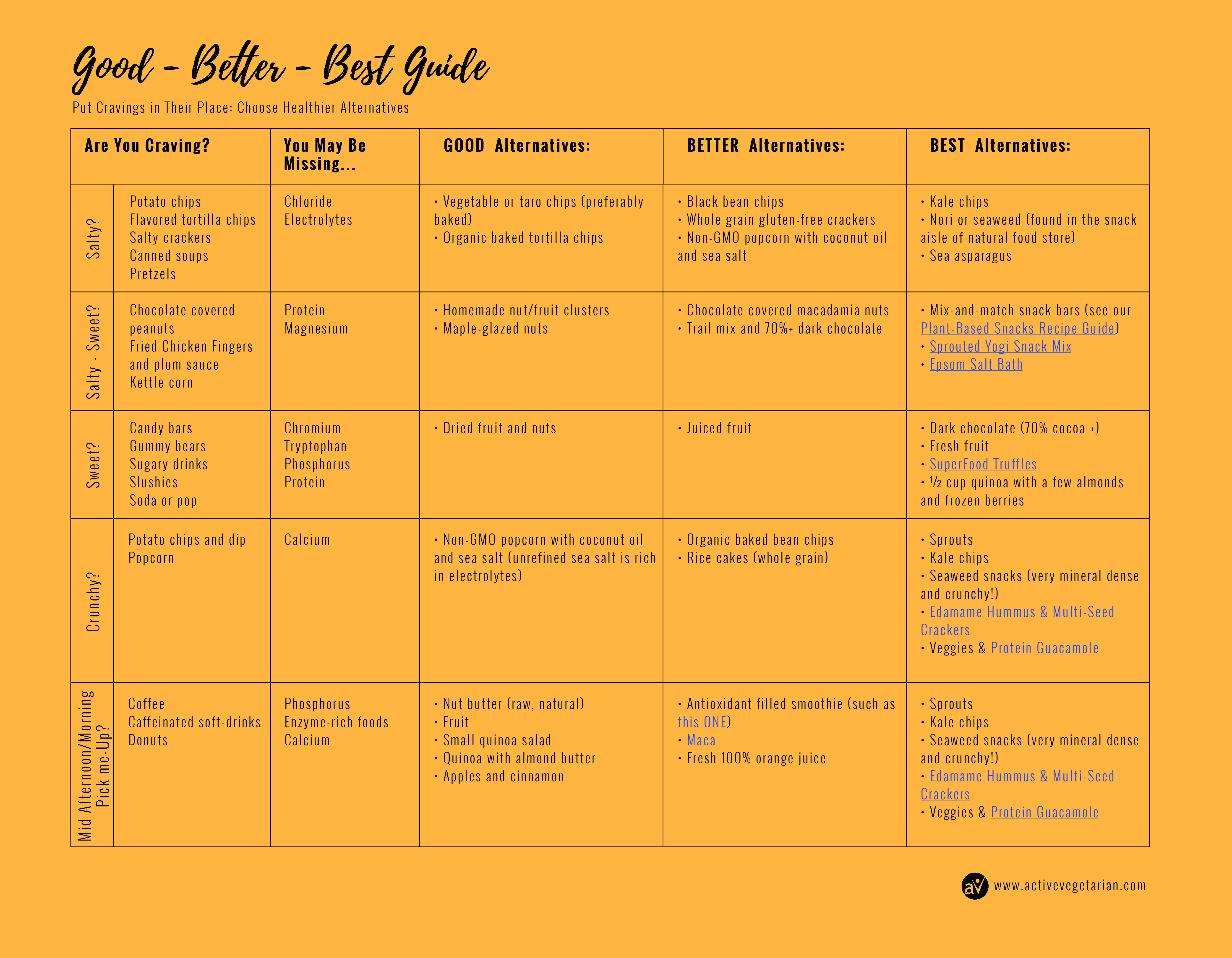
6. Manage Your Stress Levels
There is a strong correlation between stress and cravings for sweets. Too much stress can cause the brain to self-medicate. Today we are dealing with many types of stress from work to emotions, to heavy athletic training. Cravings are the first signal the body sends. When stress goes up, the body is in need of high-quality nutrition. The reason why these cravings are for sweets, rather than any other type of food, can be traced back when the only available sweet food was fruit. Therefore, assuming that sweet meant nutrition in the form of fruit, the brain sent these kinds of signals. However, today, most sweets are in the form of refined carbohydrates and processed sugars (nutritionally empty). We are ALL stressed to some extent with the way the world is today, but knowing that stress can be the cause of your sugar cravings, it’s important to incorporate lifestyle strategies into your daily routine. Try yoga or meditation. Or even just going for a walk outside and connecting with nature can help.
More Resources:
How To effectively reduce stress and anxiety with diet
7. Make Sleep a Priority
Have you ever noticed that on those days you don’t get a good sleep you crave sugary foods? With less than seven hours of sleep, the body changes the way it releases appetite-controlling hormones. When you sleep too little, your hormone levels get disrupted. Researchers have found that the lack of sleep causes the body to produce less leptin (the “satiety” hormone) and more ghrelin (the “hunger” hormone). This makes you more likely to experience food cravings. Though it might be tempting to stay up late to watch an extra episode of your favourite TV drama, you’ll be affecting more than just your energy level the next day. Committing to a healthy lifestyle requires making adequate sleep a priority, and the best way to do that is through developing healthy sleep routine – the habits, and behaviours that affect your sleep quantity and quality.
More Resources:
12 Habits To Ensure A Good Night’s Sleep and Thrive
8. Attend To Your Emotions
Sometimes, when you crave food, it is triggered by an emotional need such as searching for relieve after a tiring day and even if you’ve got all of the above dietary and lifestyle criteria down, you can still easily fall back on an unhealthy diet if you haven’t addressed your mind. Something Nikki and I have learned over the years of working with clients is that emotional eating is a tricky issue. We have to deal with in our own way and in our own time, and no one-size-fits-all advice is going to cut it. However in all cases, actually allowing our emotions to surface, looking them in the eye, and dealing with how they make us feel is a freeing experience that leaves us better off than we were. On the other hand, running from them with the help of chocolate croissants and a bag of Doritos won’t lead you where you want to go. If you feel that your emotions, or your own self-image, maybe your own worst enemy when it comes to changing your relationship with food, we highly recommend you consider trying our AV Coaching Program.
More Resources:
6 Steps You Can Apply Right Now To Overcome Emotional Eating
KEY TAKEAWAYS:
- Cravings are important bodily signals! Do you need to be fed, or do you need to be nourished? You will find when you are fueling your body with nutrient-dense foods you can help crowd out cravings.
- Pay attention to your craving. Sweet cravings are caused by low-energy or fatigue, and dehydration. It’s a survival signal for quick energy. Give your body the macro and micronutrients it needs, stays properly hydrated and your hunger mechanism will shut down and you will feel satisfied.
- Remember that in order to minimize your sugar intake, you need to avoid most processed foods, as most contain added sugar. Even savoury foods like salad dressing, soup, and bread often contain sugar.
- Provide your body with whole, nutrient-dense, plant-based foods such as fresh fruits, vegetables, herbs, nuts, seeds and whole grains and you’ll crowd out cravings.
- By adding nutrient-dense foods that provide complete nourishment, you will have less room for unsatisfying nutrient-poor food, and you won’t feel deprived.
- Slowly adding the filling, nutrient-dense food to your meals will help reduce situation-specific cravings, as will snacking on nutrient-dense options throughout the day.
- Adopt an overall healthy lifestyle -incorporate practices that will help you manage stress, make exercise part of your daily ritual, focus on getting a good night’s sleep and take time to process your emotions.
In the end, transitioning to a new healthy lifestyle comes down to how much you want it. As humans, our behaviours are driven by two principles – the need to avoid pain and desire to gain pleasure. If the pleasure of binging on ice cream, pizza, chips and chocolate overrides the perceived pain of being unhealthy, then you’ll continue to eat this way. When you shift your perspective, your body follows. Associate more ‘pain’ with binge eating and more ‘pleasure’ with your goal of vibrant health and you’ll see results. You embarked on a new lifestyle for a reason. Reconnect with your reason why.
Finally, keep in mind that real healing happens from within – if you’re not already taking control of your health, it’s time to do so NOW. Do your very best to embrace these eight strategies and take responsibility into your own hands. Get in touch if you need a boost.
WATCH THE EPISODE HERE:
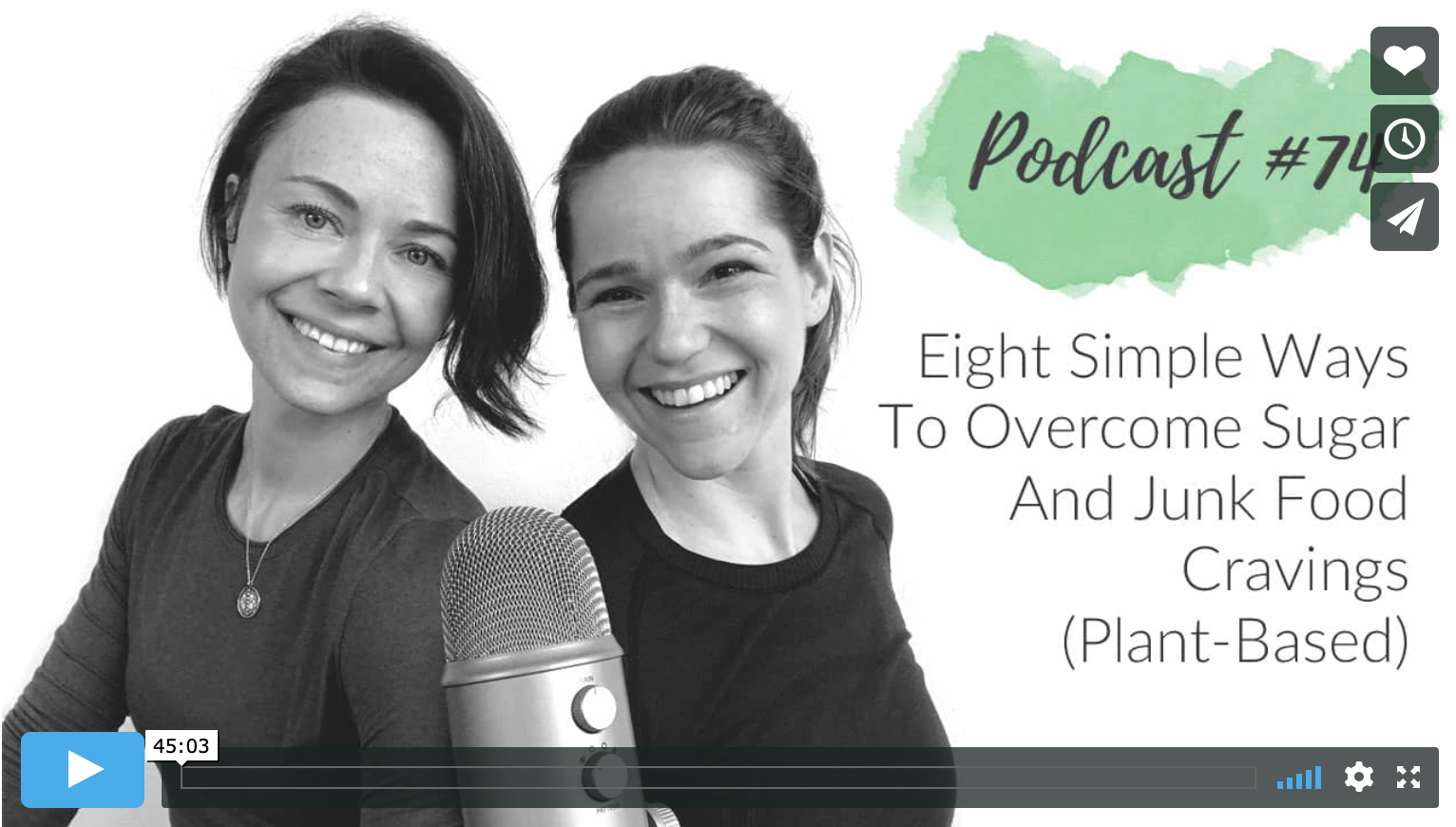
*If you enjoyed it – please do us a favour and share it on social media. Thank You!
Have a question about a plant-based lifestyle? No question is too simple or obvious to ask. We are here for you so leave them below!
Dedicated to your health & well-being,

Sources and References:
JAMA Internal Medicine February 3, 2014 [Epub ahead of print]Weight Control, Pure and Simple by Dr. Norman Walker
Greenmedinfo.com August 30, 2014
The Truth About Sugar Addiction
The Effect of Two Energy-Restricted Diets, a Low-Fructose Diet vs. a Moderate Natural Fructose Diet
Weight loss associated with a daily intake of three apples or three pears among overweight women
Increasing Insulin Sensitivity – Diabetes Self-Management
Want some hands-on helpful guidance?
Whether you’re new to the plant-based diet or have been a veggie for a while, you might be wondering what the heck to eat? Which foods make up a healthy plant-based diet? How do you fit exercise into your busy schedule? How to stay motivated and achieve the goals you set for yourself?
Or perhaps you often ask yourself “Is my diet well-balanced? Is it providing the nutrition I need? Am I taking the right steps towards achieving optimal health? “
And how confusing is it when you read one thing that says “This Thing“ is GOOD for you, and then you turn around and read something else that says “That exact thing” is BAD for you? It can be really confusing out there!

